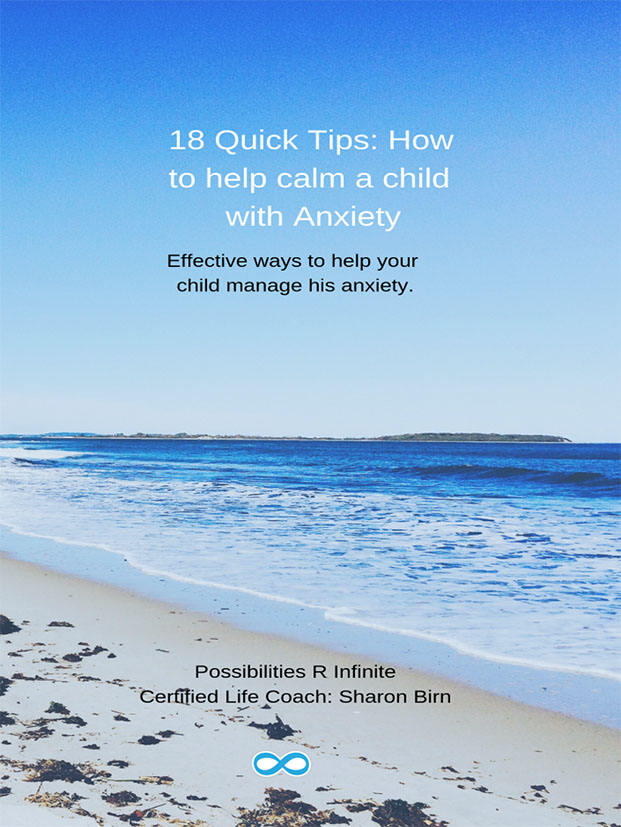
Letter from Life Coach Sharon Birn
Hey, Thank you so much for downloading my eBook.
My name is Sharon Birn and I’m a Certified life and family coach. Having worked with many individuals and families, in which there are members with special needs, it became clear to me that there are several areas that need to be addressed if you’re going to create a more cohesive, calm, and healthier family unit. Using my unique blend of life and family coaching I’ve been able to help families develop strategies and systems that allow them a more effective way of managing the “daily grind,” thus creating a balance that helps families to “run’ more effectively, leading to more joyous, quality family time.
Are you a parent of a child struggling with Anxiety?
Are you often wondering, how can I best help my child through this situation?
Does your own anxiety rise, as your child’s does, because you often find yourself clueless on what to do next?
Are you READY to take action and be the best parent you can be? Don’t delay, contact me, Today!
Deep Breathing
When you see your child getting anxious start doing some deep breathing with him/her. Showing him how to deep breathing deep breath and focus on his/her breathing will focus him to push his anxious thoughts to the ‘back burner.”
Validation is key
Say something like, I can see you are scared/nervous. I have been scared and nervous before too, I know something about how bad that can feel.
Get support
You cannot and should not do this alone. Reach out to a Therapist, Psychologist, Psychiatrist, or Life Coach
Reframe
Help you child learn reframe his anxious thoughts. Doing so effectively will build confidence/self-esteem.
Avoid the pitfall of the “label” Reframe form labelling your child a worrier. This will make him feel different and alone. Let him know that everyone worries at times. Teach him that there is a purpose that worry serves. It motivates us to take action/problem solve.
Connect with your child
Connect with your child when they are anxious. Try to recall a time when you felt true fear. True connection will only take place after you have transported yourself back to a time when you felt this true fear and you have reminded yourself of what you felt like in that moment. Next, ask your child “how can I help, what can I do to make this easier.
Stay calm
Often when your child gets anxious your anxiety will begin to rise as well. You will be concerned that he won’t be ready for school, appointment, or that he might disappoint his friends or family by refusing to go somewhere and forcing you to cancel previous set plans. You and your child will experience heightened anxiety as your anxiety will be feeding off each other’s. Conversely, the calmer you can stay, calmer your child will be.
Build in cushions
Build in cushions of time when having to get places. Allow for the effects the anxiety will have on your ability to get ready, and get somewhere on time.
Your child is not purposely
being defiant Remember: your child is not purposely being
defiant, difficult. He is not being “behavioral,” his behavior is NOT one requiring disciplinary action
Your child truly cannot explain his anxiety, at times
Be accepting if your child cannot tell you why he is anxious. Often, he truly does not know, and/or cannot articulate what is making him anxious.
Avoid the pitfall of the “label”
Refrain from labeling your child a worrier. This will make him feel different and alone. Let him know that everyone worries at times. Teach him that there is a purpose that worry serves. It motivates us to take action/problem solve.
Defiant
Avoid trying to “fix it. ”Be willing to “just be with him.”
Ensure your child you are not mad at him
 Let your child know it is okay that he is feeling anxious you are not mad at him
Let your child know it is okay that he is feeling anxious you are not mad at him
Inspire, motivate and build his confidence
Your child is feeling horrible not only from the anxiety itself but from not being able to follow through on things he and/or you need to do.
Try to use words that will inspire, motivate and build his confidence to get through the situation.
He can do it again.
Remind him of times he has felt anxious before where he has successfully gotten through it. If he did it then, he can do it again.
Pay attention to your child’s behavior
Behaviour is a powerful; form of communication observing your child’s behaviour will tell you much about his emotions that he cannot/will not articulate verbally.
Be kind to yourself!
Remind yourself it is okay to be overwhelmed at times (it is okay to scream, yell or cry). You are dealing with a lot. Being kind to yourself will help you cope better, which in turn, helps you help your child more effectively.
Remind your child the thoughts/feelings will pass.
You know that because he has had these thoughts and feels before and they have eventually passed.
Problem solve beforehand
If you know that your child is going into a situation that is a known trigger. Talk about ways he can cope within the situation prior to being in the situation.
What’s Next?
That’s 18 tips to get you started with more effectively helping a child manage his anxiety.. Of course it’s just the beginning of what you need to do to develop a successful game plan for effectively coping with anxiety. If you want to learn more or you need support from someone who understands feeling like you’re just spinning your wheels getting no where Sign up for my to work with me one on one.
My one to one coaching are personalized to meet the specific needs and or desired outcomes of the individuals and families I serve. I will work with you step by step so that you can create effective and successful ways to help your child manage his anxiety so that he controls it, rather than it control him and your family unit. Your child will learn how to be the “boss” of his anxiety. This will allow your child and family to live the life he/ you want, NOT the one being dictated my the demands of his anxiety.
Unlike other coaching options, with me there’s no more waiting until your next session to ask a question. I’m only a message away for quick questions and accountability in between sessions via email or Facebook Messenger.
It’s budget friendly because it’s a monthly payment and you don’t have to pay for a block of sessions up front. You can cancel it anytime if you feel you’ve got what you need or your finances change.
Whether you decide to work with me or not my ‘Emotional Well-being and Perspective Checkpoint’ Facebook group is a great place to hang out, make friends, network and get support. Everyone is really friendly and I’m sure you’ll feel right at home.
All the Best,
Sharon
www.possibilitiesrinfinite.com




